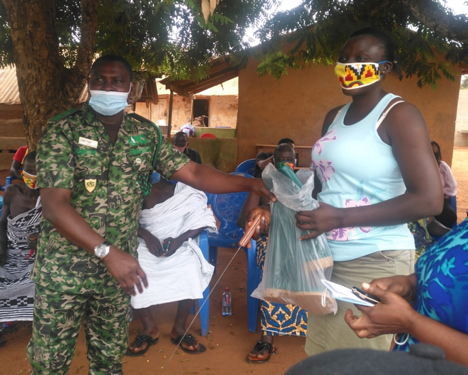The Forestry Commission has expressed worry over selfish and unlawful conduct by opinion leaders in forest-fringe communities that undermines efforts to control the rate of forest resource exploitation in the country.
According to the Commission, some chiefs and Assembly members have been taking illegal levies from chain-sawing operators as well as shielding the nomadic perpetrators in their communities. A practice it [Forestry Commission] laments, thwart attempts to discourage the activities of illegal lumbering and logging – major contributory factors to depletion of forest cover.
The Bechem District Manager of the Forest Service Division (FSD) of the Forestry Commission, Dominic Oteng who raised the issue, cited a case study wherein the Traditional Authorities and Assemblymen at Bomaa in the Tano North Municipality of the Ahafo Region mounted separate barriers, levying each loaded lumber truck GH¢50.
He said: “Such unlawful behaviour makes a community like Bomaa a safe haven for illegal lumber operators. A charge of GH¢50 is peanuts for them, and therefore opens the floodgates for many others to join the destruction of the forest. Our opinion leaders must rather collaborate with FSD and security forces to flush out these perpetrators in the communities”.
The Bechem FSD Manager further mentioned illegal farming in forest reserves, illegal mining and perennial bush fires as other human activities fuelling forest depletion in the country. He appealed to all and sundry to put their shoulders to the wheel in the fight against the menace in order to safeguard the country’s remaining forest cover.
He was speaking at a sensitisation workshop held at Konkontreso for members selected from forest-fringe communities in the Bechem Forest district of the Ahafo Region. The engagement among others sought to sensitise local people about the socioeconomic and health importance of protecting forest reserves by ensuring sustainable use of forest resources.
The participants were drawn from Konkontreso, Acherensua, Maaban and Akwasiase. The stakeholder sensitisation workshop formed part of a campaign for sustainable management and use of Ghana’s forest reserves. It was orgainsed by an NGO – Livelihood and Environment Ghana (LEG), with financial support from Green for Growth Fund (GGF) and WOMADIX Fund.
Deforestation has been an unabated canker, increasingly sweeping away the country’s forest reserves. According to the Forest Investment Programme Report (FIP, 2014), Ghana’s forest reserve which was estimated at 8.3 million hectares in the 1900s has reduced drastically by 7.0 million ha, remaining with only 1.3 million ha.
The Head of the Centre for Climate Change and Gender Studies at the University of Energy and Natural Resources (UENR) in Sunyani, Daniel Akoto Sarfo, said the alarming negative impact of climate change on the environment, especially on farming activities, should be a wake-up call for more pragmatic measures to stem deforestation.
He noted that formulation of policies and forest-inclined programmes are not enough to defeat the social canker, indicating that: “Forest protection is a shared responsibility, and therefore it’s imperative for duty-bearers to educate the public to appreciate the need for all to be ambassadors of forest protection”.
The Executive Director of LEG, Richard Adjei-Poku, said the campaign will be extended to other forest regions – Ashanti, Western North, Eastern and Central – to increase the knowledge of forest-fringe community members across the country. He added that well-educated forest-fringe communities, and effective collaboration among the Forestry Commission, academia and civil society organisations, will advance the goal of sustainable forest resources management – hence the campaign.










